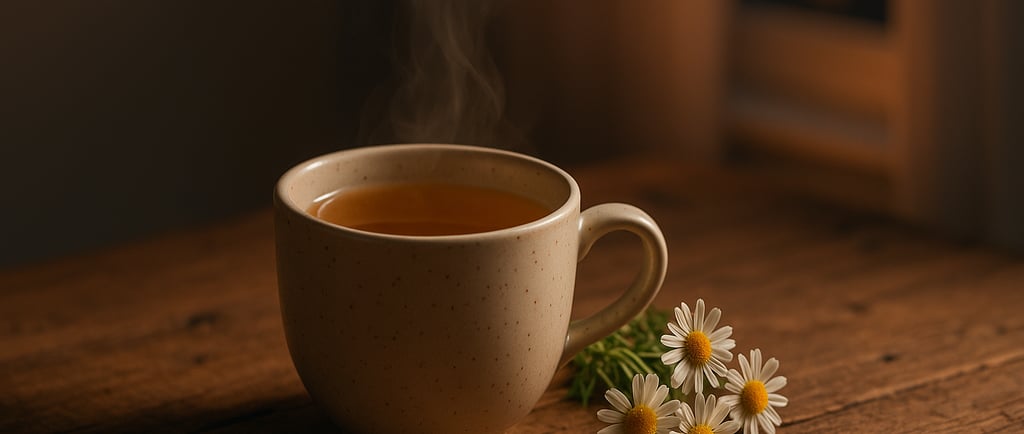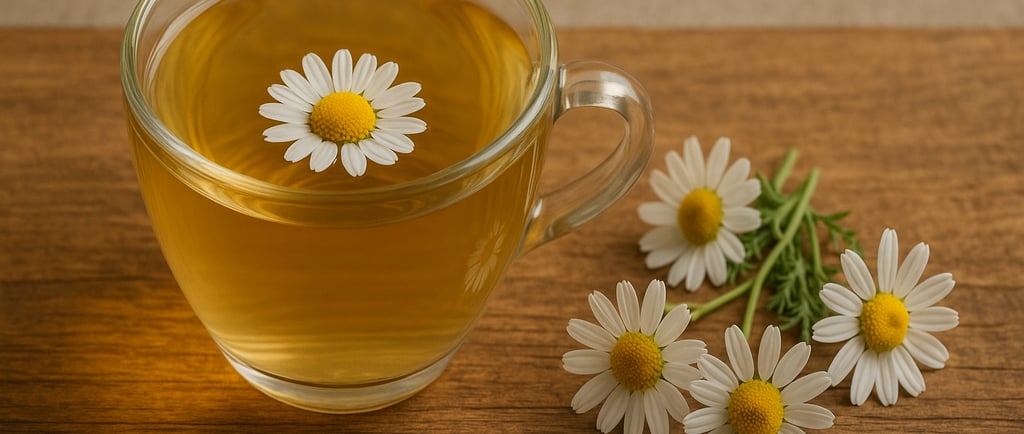Chamomile Tea Benefits: Relax Naturally and Sleep Better
Discover the soothing power of chamomile tea. Learn how this herbal remedy reduces stress, improves sleep, and supports your natural wellness journey.
TEAS
5/8/20244 min read


Discover the Incredible Benefits of Chamomile Tea for Your Health and Wellness
Chamomile tea has long been celebrated as a natural remedy for promoting relaxation and enhancing overall wellness. With its delicate floral aroma and soothing properties, this herbal infusion has found a place in households worldwide as a gentle yet effective solution for stress relief, improved sleep, and digestive support. But beyond its comforting qualities, chamomile tea is packed with antioxidants and bioactive compounds that offer a wide range of health benefits.
In this comprehensive article, we will delve deep into the science-backed advantages of chamomile tea, explore its rich cultural history, provide practical preparation tips, and answer common questions to help you integrate this ancient brew into your modern wellness routine.
What is Chamomile Tea?
Chamomile tea is made from the dried flowers of the Matricaria chamomilla (German chamomile) or Chamaemelum nobile (Roman chamomile) plants. Renowned for centuries in traditional medicine, chamomile is prized for its calming effects on the nervous system and digestive tract. Unlike caffeinated teas, chamomile is naturally caffeine-free, making it an ideal beverage for evening relaxation.
The key active constituents in chamomile include flavonoids such as apigenin, which bind to receptors in the brain to promote sedation and reduce anxiety. Additionally, chamomile contains antioxidants like quercetin and chamazulene that combat oxidative stress and inflammation throughout the body.
History and Cultural Significance of Chamomile
Chamomile has been used for thousands of years, with origins tracing back to ancient Egypt, Greece, and Rome. The Egyptians dedicated chamomile to their gods for its healing properties, while Greek physicians Hippocrates and Dioscorides documented its use for ailments ranging from digestive disturbances to inflammation.
In medieval Europe, chamomile was a staple herb in monasteries, valued for its wide range of medicinal applications. Today, it remains a popular herbal remedy worldwide, embraced by modern herbalists and backed by scientific research.
Nutritional Profile of Chamomile Tea (Per 100ml brewed tea)
NutrientAmount% Daily Value (DV)Calories2 kcal0.1%Carbohydrates0.4 g0.1%Protein0.1 g0.2%Fat0 g0%Calcium2 mg0.2%Magnesium0.2 mg0.05%Potassium5 mg0.1%AntioxidantsHigh—
Chamomile tea is extremely low in calories and macronutrients, making it a light, hydrating beverage. Its real value lies in its abundance of antioxidants and phytochemicals, which support health beyond basic nutrition.
Top Health Benefits of Chamomile Tea
1. Promotes Relaxation and Reduces Anxiety
Chamomile’s most celebrated benefit is its ability to calm the nervous system. Studies have shown that apigenin, a flavonoid in chamomile, binds to benzodiazepine receptors in the brain, producing sedative and anxiolytic effects without the side effects of pharmaceutical drugs. Regular consumption can help reduce symptoms of generalized anxiety disorder and promote a peaceful state of mind.
2. Improves Sleep Quality
Sleep disorders affect millions worldwide, and chamomile tea has long been a natural sleep aid. Clinical trials suggest that chamomile improves sleep onset, duration, and quality by modulating the GABA neurotransmitter system, which controls relaxation and sleep cycles.
3. Supports Digestive Health
Chamomile has antispasmodic properties that soothe the digestive tract. It helps relieve indigestion, bloating, and gas by relaxing muscles in the intestines. Its anti-inflammatory effects may also benefit individuals with gastrointestinal conditions such as irritable bowel syndrome (IBS).
4. Anti-inflammatory Properties
The antioxidants in chamomile, including chamazulene and bisabolol, have potent anti-inflammatory effects. These compounds help reduce inflammation markers, potentially aiding conditions such as arthritis and other chronic inflammatory diseases.
5. Boosts Immune System
Chamomile contains compounds that stimulate immune function, helping the body fend off infections. Its antimicrobial effects have been demonstrated against bacteria and viruses, supporting overall immunity.
6. Skin Health Benefits
Topical and oral use of chamomile can improve skin health. Its anti-inflammatory and antioxidant properties help treat skin irritations, eczema, and minor wounds, promoting faster healing and reducing redness.
How to Prepare the Perfect Cup of Chamomile Tea
Use 1-2 teaspoons of dried chamomile flowers per cup of boiling water.
Steep for 5-10 minutes to extract maximum flavor and bioactive compounds.
Strain and enjoy plain or with a touch of honey or lemon for added taste.
For enhanced benefits, consume chamomile tea about 30 minutes before bedtime.
Possible Side Effects and Precautions
While chamomile tea is generally safe for most people, some may experience allergic reactions, especially if allergic to ragweed or daisies. It’s advised that pregnant women consult healthcare providers before regular consumption. Chamomile can also interact with blood thinners and sedative medications, so caution is warranted.
Chamomile Tea vs Other Herbal Teas: A Comparison
Compared to other popular herbal teas like peppermint, ginger, or lavender, chamomile stands out for its unique calming and sleep-promoting effects. While peppermint aids digestion and ginger reduces nausea, chamomile’s broad spectrum of benefits makes it a versatile choice for overall wellness.
Frequently Asked Questions (FAQs)
1. What does chamomile tea taste like?
Chamomile tea has a mild, floral, and slightly sweet flavor with apple-like undertones.
2. Can I drink chamomile tea daily?
Yes, moderate daily consumption is safe for most people and can support long-term wellness.
3. Is chamomile tea safe for children?
Generally, yes, but consult a pediatrician before giving chamomile to very young children.
4. Does chamomile tea help with menstrual cramps?
Yes, chamomile’s muscle-relaxing and anti-inflammatory properties can alleviate menstrual pain.
5. Can chamomile tea cause drowsiness?
Yes, its sedative effects can cause mild drowsiness, so avoid driving or operating heavy machinery after drinking.
Fun Facts and Curiosities About Chamomile
The name “chamomile” comes from the Greek word “khamaimēlon,” meaning “earth apple,” referring to its apple-like scent.
Chamomile was used by ancient Egyptians as a remedy for fever and infections.
It’s one of the most widely used herbs in traditional medicine worldwide.
Chamomile essential oil is commonly used in aromatherapy for relaxation.
The flower opens only in sunlight and closes at night.
Final Thoughts: Should You Add Chamomile Tea to Your Daily Routine?
Chamomile tea is more than a comforting drink—it’s a powerful herbal ally that promotes relaxation, supports sleep, soothes digestion, and boosts your immune system naturally. Its gentle yet effective properties make it suitable for daily consumption and a valuable addition to any holistic wellness regimen. Embrace the soothing ritual of chamomile tea and experience the benefits of this time-honored botanical treasure.
References (ABNT Style)
LORENZI, Harri. Brazilian Fruits and Cultivated Exotics. Instituto Plantarum, 2006.
ALMEIDA, Sílvia R. Plantas Medicinais no Brasil: Nativas e Exóticas. Editora UFSC, 2014.
CARVALHO, L. Fitoterapia Funcional. Editora Senac São Paulo, 2012.

